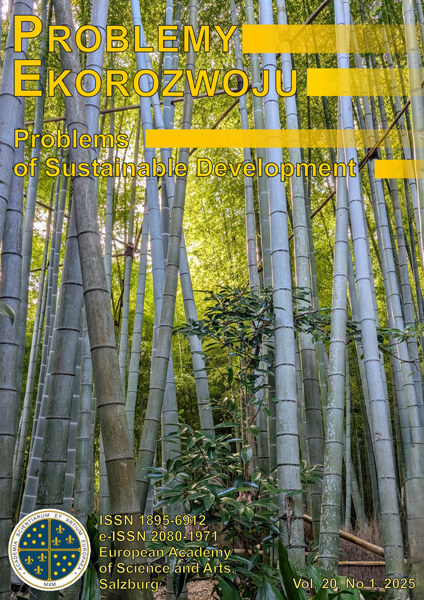Zagubieni w tłumaczeniu: problem z prawidłowym wyrażeniem terminu rozwój zrównoważony w językach spoza świata Zachodu – przykład Korei Południowej
Kwang-Hoon Baek
Alumnus Graduate School of Science and Technology Policy, KAIST (Korea Advanced Institute of Science and Technology), Daejeon (Korea Południowa)
Nakil Ko
Alumnus Master of Science Journalism Program, KAIST, Daejon (Korea Południowa)
Abstrakt
W tej pracy podejmujemy użyteczne i relatywnie rzadko stosowano podejście do zrównoważonego rozwoju, rozumianego zarówno jako pojęcie, jak i koncepcja. Zwykle dominuje tu podejście normatywne, w ramach którego poszukuje się idealnej definicji, my proponujemy podejście historyczne, zgodne z zaleceniami historyka i filozofa Quentina Skinnera, odnoszące się do przeszłych zmian w definiowaniu i ich wpływu na obecne rozumowanie. Aby zilustrować, jak bardzo takie zmiany mogą być istotne, celowo wybraliśmy jeden kraj, Koreę Południową, w którym nawet przetłumaczenie terminu rozwój zrównoważony, w powiązaniu z innymi czynnikami, powoduje jego odmienne (niż to obowiązujące w podejściu normatywnym) rozumienie przez społeczeństwo. Miast rozwoju gwarantującego ochronę środowiska i społeczną pomyślność i wzrost gospodarczy, w standardowym koreańskim tłumaczeniu termin ten jest rozumiany jako trwały wzrost gospodarczy, do którego należy dążyć nawet za cenę degradacji środowiska. W badaniach opieraliśmy się na różnych metodach, uwagę zwracając na kluczowe sektory i obszary polityki, włączając w to kwestie energetyczne. Wykażemy, dlaczego takie podejście może być metodologiczne użytecznym dodatkiem do badań nad zrównoważonym rozwojem.
Słowa kluczowe:
rozwój zrównoważony, historia konceptualna, język, tłumaczenie, Korea Południowa, wzrost gospodarczy, polityka energetycznaBibliografia
DE KRUIJF H., VAN VUUREN D., 1998, Following Sustainable Development in Relation to the North-South Dialogue: Ecosystem Health and Sustainability Indicators, in: Ecotoxicology and Environmental Safety, vol. 40, no. 1, p. 4-14.
Google Scholar
EPB, Economic Planning Board, 1986, The 6th Five-year Economic Development Plan: The Plan for Energy and Resources, in: Korea Petroleum Association Magazine, vol. 62, p. 50-57.
Google Scholar
HA S., 2012, Abuse of Sustainability, in: HERI Insight, vol. 6, no. 1, p. 1-25.
Google Scholar
KABC, Korea Audit Bureau of Circulation, 2011, The Number Of Daily Paper Copies Sold in 2010, http://www.kabc.or.kr/about/issuereference/241?param.page (4.02.2015).
Google Scholar
KANG K., 2000, 5-year Economic Development Plan: the Assessment of the Goal and Execution, Seoul National University Press, p. 90.
Google Scholar
KEEI, Korea Energy Economics Institute, 1991, Yearbook of Energy Statistics.
Google Scholar
KEEI, Korea Energy Economics Institute, 2002, Yearbook of Energy Statistics.
Google Scholar
KEEI, Korea Energy Economics Institute, 2011, Yearbook of Energy Statistics.
Google Scholar
KIM H., 2009, The History of Korean Energy Policy Regime, Ph.D. Diss., Korea University, p. 138-158.
Google Scholar
KIM J., 1998, The Political Economy of Energy Transition: An Institutional Approach, in: Journal of Environmental Policy and Administration, vol. 6, no. 2, p. 53-77.
Google Scholar
KIM P. and SAH D., 1998, Understanding and Concept-Forming of Sustainable Development, in: Korea Political Review, vol. 32, no. 4, p. 71-88.
Google Scholar
MARK, N., NOVARIK, W., 1996, Mass Media and Environmental Conflict: America's Green Crusaders. Sage, Thousand Oaks.
Google Scholar
MCIE, Ministry of Commerce, Industry and Energy, 2002, The Second Master Plan for National Energy (2002-2011).
Google Scholar
MER, Ministry of Energy & Resources, 1981, The Ministry of Energy & Resources: the keynote of energy policy, in: Korea Petroleum Association Magazine, vol. 11, p. 66-68.
Google Scholar
MER, Ministry of Energy & Resources, 1988, 10-Year History of Energy and Resources Administration, p. 23-45.
Google Scholar
MOON S., 1995, Ecological Strategy for Sustainable Society, Narasarang, Seoul.
Google Scholar
MOON T., 1997, Environmental Policy, Hyungseol, Seoul.
Google Scholar
MTIE, Ministry of Trade Industry and Energy, 1997, The First Master Plan for National Energy (1997-2006).
Google Scholar
MURPHY K., 2012, The Social Pillar of Sustainable Development: A Literature Review and Framework for Policy Analysis, in: Sustainability: Science, Practice, & Policy, vol. 8, no. 1, p. 15-29.
Google Scholar
PAK M., 2011, Environmentalism Then and Now: From Fears to Opportunities, 1970-2010, in: Environmental Science & Technology, vol. 45, no. 1, p. 5-9.
Google Scholar
PARK C., 2004, Critical Understanding of Environmental Management, in: Yonsei Business Review, vol. 41, no. 1, p. 45-70.
Google Scholar
PCSD, Presidential Commission on Sustainable Development, 2007, On a survey of what people recognize about sustainable development, http://pcsd.pa.go.kr/board/download.php?db=bbs42&uid=40 (4.02.2015)
Google Scholar
PMO, Prime Minister's Office, 2008, The First Master Plan for National Energy (2008-2030).
Google Scholar
SKINNER Q., 2002, Visions of Politics Vol. 1: Regarding Method, Cambridge University, Cambridge.
Google Scholar
WCED. 1987, Our Common Future, Oxford University Press, New York.
Google Scholar
YUN S., 2002, Sustainable Development and Energy Policy in the 21st Century: The Need for Energy System Transformation and Desirable Directions for Energy Policy Change, in: Korean Public Administration Review, vol. 36, no. 2, p. 147-166.
Google Scholar
YUN S., 2008, Energy Alternatives in the Era of High Oil Prices and Climate Change: Focused on a Critical Analysis of the Third Master Plan for National Energy, in: Environment and Life, vol. 57, p. 126-147.
Google Scholar
YUN S., 2009a, The Ideological Basis and the Reality of Low Carbon Green Growth, in: ECO, vol.13, no.1, p. 219-266.
Google Scholar
YUN S., 2009b, The Problems of Green Growth and the Opposite Direction of Energy Policy, in: Environment and Life, vol. 60, p. 17-50.
Google Scholar
Autorzy
Kwang-Hoon BaekAlumnus Graduate School of Science and Technology Policy, KAIST (Korea Advanced Institute of Science and Technology), Daejeon Korea Południowa
Autorzy
Nakil KoAlumnus Master of Science Journalism Program, KAIST, Daejon Korea Południowa
Statystyki
Abstract views: 30PDF downloads: 16
Licencja

Utwór dostępny jest na licencji Creative Commons Uznanie autorstwa – Na tych samych warunkach 4.0 Miedzynarodowe.




